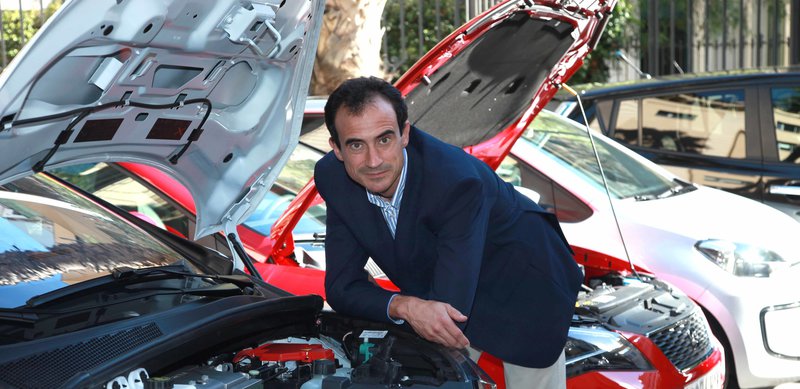Interview
'Dieselgate could encourage their use'
Ramon Caus (Barcelona, 1977) is passionate about four wheels, as can be seen from his career as a karting racing driver (39 victories, 57 podiums and Spanish champion in 1995). He is also an expert in driving instruction for recognised schools and a businessman in the automobile sector.
Caus is the creator of the ECOseries, the first championship in Spain based on energy efficient vehicles and one of the first in Europe. He is also the president of Expoelèctric, the electric car trade fair that celebrated its fifth edition in October in Barcelona. Caus knows as much as anyone about battery-driven cars.
What is the future of the electric car?
Basically, we are looking at a much more segmented market in the future. If today, in general, some 60% of registered vehicles are diesel, with another 39% using petrol and 1% electric, in the next 10 years we are probably looking at 20% of cars being petrol, between 10 and 15% diesel, another 20% electric, 15% gas and between 5 and 10% powered by other types of energy, such as hydrogen.
Why so many different types?
Each type of vehicle responds to a different need. It makes little sense for someone who only does about 30 kilometres a day to go and buy a diesel-driven car. It just does not make financial sense.
However, the prices of electric vehicles are still not in everyone's reach.
No. With the crisis, few people consider buying an electric or plug-in hybrid vehicle, despite the many financial inducements, such as reduced tolls, subsidised or free parking, and other incentives. However, it now seems as if sales are rising and that people are beginning to see it as another option. You also need to bear in mind that while the price of an electric car is a bit higher than that of a conventional vehicle, in the long term the savings on fuel and maintenance are significant. The difference in price can be seen above all in the more economical vehicles. If a car costs 15,000 euros, a similar electric model will cost you about 4,000 euros more. However, with higher-end cars that cost more than 60,000 euros, there is almost no difference in the prices of electric and conventional vehicles. The same is true for the likes of light goods vehicles, which for cities is a good economic option.
I suppose the sector today is very different than it was just a few years ago.
About four or five years ago there was a big change, with sales on the rise in just about all sectors of the market and manufacturers starting to use new technology to develop increasingly efficient batteries. The aim now is to make batteries lighter that will charge quicker and also provide greater range. I think that the next 10 years will be crucial.
Which companies are leading research in this field?
We could say that Nissan and Renault are a step ahead of the other manufacturers, even though all of them are now involved in the market, but they were the first ones to take it seriously. Another pioneer in the sector is the Tesla company, which makes what we could call the ferraris of electric vehicles. They are expensive cars but have a good position in the market in the US and northern Europe. Depending on the market, they provide direct competition to brands such as Mercedes and BMW and have developed vehicles with a range of 400 to 500 kilometres. In terms of countries, Norway is the leader, with 20% of their cars being electric thanks to a tax system that penalises the use of conventional combustion engines.
Could dieselgate have a positive effect on the electric car market?
It could accelerate their adoption in cities like Paris, which is looking into banning diesel vehicles in the centre of the city. It could speed things up, but the electric vehicle is a reality and it is here to stay.
Leave a comment
Sign in.
Sign in if you are already a verified reader.
I want to become verified reader.
To leave comments on the website you must be a verified reader.
Note: To leave comments on the website you must be a verified reader and accept the conditions of use.

